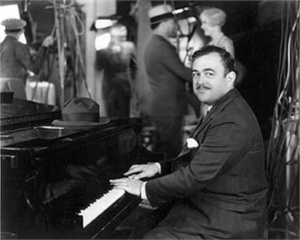Stories of Standards—Tangerine
Tune in weekday mornings for Stories of Standards to hear our favorite versions of “Tangerine.” Rodney Franks presents Stories of Standards Monday through Friday at 7:50 and 8:50 a.m.!
Stories of Standards is sponsored by ListenUp.
 Victor Schertzinger composed “Tangerine” for the 1942 film “The Fleet’s In.” He also directed the film, produced it, wrote the screenplay, conducted the music and was violinist. He also composed the film’s other hit song “I Remember You,” while Johnny Mercer wrote the lyrics for both songs. Starring Dorothy Lamour and William Holden, this was the film in which Betty Hutton debuted. The Jimmy Dorsey Orchestra featured prominently, with Bob Eberly and Helen O’Connell as vocalists.This first recording lasted 15 weeks on the charts and peaked at #1, with slightly different lyrics than in the movie. At least 89 recordings have been made, ranging from Stan Getz’ 1956 recording to Marian McPartland’s 1991 recording at her 85th birthday party. Johnny Mercer said about it: “I don’t know why I called it ‘Tangerine’, except that it had a kind of Latin flavor, the melody.” One of Mercer’s biographers attributed the film’s initial popularity to its focus on a part of the world not engulfed by World War II. A disco instrumental of the song went to the top twenty in the US in 1976.
Victor Schertzinger composed “Tangerine” for the 1942 film “The Fleet’s In.” He also directed the film, produced it, wrote the screenplay, conducted the music and was violinist. He also composed the film’s other hit song “I Remember You,” while Johnny Mercer wrote the lyrics for both songs. Starring Dorothy Lamour and William Holden, this was the film in which Betty Hutton debuted. The Jimmy Dorsey Orchestra featured prominently, with Bob Eberly and Helen O’Connell as vocalists.This first recording lasted 15 weeks on the charts and peaked at #1, with slightly different lyrics than in the movie. At least 89 recordings have been made, ranging from Stan Getz’ 1956 recording to Marian McPartland’s 1991 recording at her 85th birthday party. Johnny Mercer said about it: “I don’t know why I called it ‘Tangerine’, except that it had a kind of Latin flavor, the melody.” One of Mercer’s biographers attributed the film’s initial popularity to its focus on a part of the world not engulfed by World War II. A disco instrumental of the song went to the top twenty in the US in 1976.
Victor Schertzinger (Apr 4, 1888 – Oct 26, 1941) was a prodigy who played violin with professional orchestras by the time he was eight years old. He wrote scores for silent films, where his first film credit was for the orchestral accompaniment to “Civilization” (1915), then went on to directing actors such as Richard Dix and Mabel Normand. “The Love Parade” in 1929, starring Maurice Chevalier and introducing Jeannette MacDonald, marked his entry into talkies. He directed “Road to Singapore” and “Road to Zanzibar,” the first two films of the “Road” series starring Bing Crosby, Bob Hope and Dorothy Lamour. His 1934 movie “One Night of Love” garnered the first Oscar for Best Score. He then went back to composing and “The Fleet’s In” was his last movie, its release occurring after a heart attack led to his unexpected death in 1941. He had directed 89 films and composed scores for 50 films, has a star on the Hollywood Walk of Fame, having been in one of the earliest groups to be granted a star and his is located close to Bing Crosby’s. He was especially noted for his ability to get along with everyone.
Jo hnny Mercer (1909-1976), while best known as the lyricist of more than 1500 songs, also sang (with 13 Top 10 hits), composed songs for 100 motion pictures, wrote 23 theatrical productions (including “St. Louis Woman” and “Li’l Abner”), founded Capitol Records, co-founded Cowboy Records, and co-founded the Songwriters Hall of Fame. His widow created the Johnny Mercer Foundation to “support the discipline of songwriting in the tradition of the Great American Songbook as exemplified by the life and work of Johnny Mercer.” He went to New York, hoping to get a role in a 1930 show, which didn’t happen; instead one of his songs was used in the show, and he focused on composition. He also met Elizabeth “Ginger” Meltzer, a dancer; they married in 1931 and had two children. Their daughter Georgia Amanda was the inspiration for Mercer’s song “Mandy Is Two”. From the late 1930s to the mid+1940s, collaborators included Richard Whiting, Bernard Hanighen, Harry Warren, Rube Bloom, Harold Arlen, Hoagy Carmichael, Victor Schertzinger and David Raksin.
hnny Mercer (1909-1976), while best known as the lyricist of more than 1500 songs, also sang (with 13 Top 10 hits), composed songs for 100 motion pictures, wrote 23 theatrical productions (including “St. Louis Woman” and “Li’l Abner”), founded Capitol Records, co-founded Cowboy Records, and co-founded the Songwriters Hall of Fame. His widow created the Johnny Mercer Foundation to “support the discipline of songwriting in the tradition of the Great American Songbook as exemplified by the life and work of Johnny Mercer.” He went to New York, hoping to get a role in a 1930 show, which didn’t happen; instead one of his songs was used in the show, and he focused on composition. He also met Elizabeth “Ginger” Meltzer, a dancer; they married in 1931 and had two children. Their daughter Georgia Amanda was the inspiration for Mercer’s song “Mandy Is Two”. From the late 1930s to the mid+1940s, collaborators included Richard Whiting, Bernard Hanighen, Harry Warren, Rube Bloom, Harold Arlen, Hoagy Carmichael, Victor Schertzinger and David Raksin.
Become a Member
Join the growing family of people who believe that music is essential to our community. Your donation supports the work we do, the programs you count on, and the events you enjoy.
Download the App
Download KUVO's FREE app today! The KUVO Public Radio App allows you to take KUVO's music and news with you anywhere, anytime!